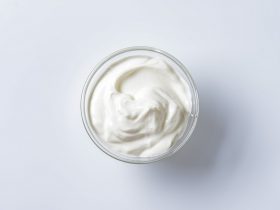Food safety can be an issue for anyone, but most especially for pregnant women. During pregnancy, a woman and her fetus have an increased susceptibility to some food-borne diseases with serious sequelae. Pathogens coming from contaminated foods include L. monocytogenes and S. enterica, which can be passed down from a pregnant woman to her fetus and increase the chances of spontaneous abortion, stillbirth and other perinatal complications (Tam et al., 2010).
Eating commercial mayonnaise bought from supermarkets during pregnancy is considered generally safe. As long as pasteurized eggs were used according to its label, then it is all right to be enjoyed even while a woman is pregnant.
Is Mayonnaise Safe to Eat During Pregnancy

Commercially available mayonnaise, dressings and sauces are generally safe to eat by pregnant women. This is because they are most probably made with eggs that have been pasteurized. Commercial products that contain eggs are required by the United States Department of Agriculture (USDA) to be made using pasteurized eggs before they are allowed to be sold.
Eggs are a good source of protein, fats and micronutrients that have an important role in basic nutrition. In some countries, egg-containing products are mandated by law to use only pasteurized eggs. Although other food industries, such as caterers and restaurants, are not bound by this law, they have also shown increasing compliance. Compared to shelled eggs, the use of pasteurized eggs offers more convenient use and easier handling and storing (Miranda et al, 2015).
Pasteurization is the process of heating food to a certain temperature with the goal of killing potential harmful bacteria present. If the label of a mayonnaise from a supermarket reads that it was made of pasteurized eggs, then a pregnant woman can go ahead and consume it without worry.
Sources of Mayonnaise to Avoid During Pregnancy

As mentioned earlier, restaurant owners are not required by law to use only pasteurized eggs in their menu. Restaurants can create their own sauces and spreads, including mayonnaise. Ask the staff if these were made from pasteurized eggs. If they cannot answer confidently, it is best for a pregnant woman not to ingest them.
Special and organic varieties of mayonnaise may be found in specialty stores and farmer’s markets. These are most probably made using raw eggs. Read the labels and ingredients, and ask the sellers, to make sure.
Homemade mayonnaise can also be a source of bacteria from unpasteurized eggs. Farm fresh eggs may have been used. Even home pasteurization is unsafe and not possible to accomplish according to the USDA. Mayonnaise and salad dressings are among the homemade foods that often contain raw eggs. Other foods include custards and ice creams, and raw cookie dough and cake batter (Tam et al., 2010).
Other foods, such as potato salad, egg salad, tuna salad, and chicken salad, all contain potentially disease-causing mayonnaise. Read the labels for any note of pasteurization done. If there is no clear evidence of this process used, it may be better to avoid them altogether.
Commercially bought mayonnaise that used pasteurized eggs may still be harmful and should be avoided if it is kept for too long. It should be stored in a refrigerator and consumed in a timely manner.
Food-Borne Diseases During Pregnancy
In general, populations at risk for higher incidence of illness related to contaminated food are characterized by a weakened immune function. During pregnancy, hormonal changes decrease the cell-mediated immune function, therefore making pregnant women more susceptible to certain types of infections. Food-borne pathogens that are particularly of concern during pregnancy include Listeria monocytogenes and Salmonella enterica, which are both associated to higher risk of adverse pregnancy outcomes (Tam et al., 2010).
Pregnant women should keep away from intake of unpasteurized milk and dairy products, deli meats, and smoked fish because of the potential risk of Listeriosis (Taylor & Galanis, 2010). Listeriosis, which is caused by L. monocytogenes, causes around 2500 serious illnesses and 500 deaths in the United States per year. It is 17 times more likely to occur during pregnancy compared to the general population (Kirkham, 2010).
No maternal mortality has been documented. However, about 20 percent of pregnant women who developed Listeriosis eventually had spontaneous abortion or stillbirth. Moreover, two-thirds of infants who survived developed Neonatal listeriosis, with clinical syndromes of pneumonia, sepsis and meningitis (Kirkham, 2010).
Pregnant women should also avoid ingestion of raw or undercooked eggs. Eggs are one of the most common causes of infection with Salmonella, a food-borne disease caused by nontyphoidal Salmonella bacteria. In the United States, the prevalence of infected eggs is estimated to be approximately 1 in 30,000 to 1 in 10,000 (Tam et al., 2010).
Salmonella enterica, serovars Enteritidis and Typhimurium, are responsible for majority of food-borne illnesses relating to intake of eggs and egg products. In Europe, contaminated eggs still remain the most prominent source of human infection with Salmonella enterica (Miranda et al., 2015).
Pregnancy is not a risk factor for Salmonella infection. Therefore, pregnant women are not at increased risk for this disease. However, bacteremia (presence of Salmonella in the blood) occurs in around 4 percent of cases and may lead to intrauterine sepsis (Tam et al., 2010).
Final Thoughts
Food safety is particularly tricky among pregnant women. Eggs and egg-containing products are the most common sources of Salmonella infections. Mayonnaise can be safely consumed during pregnancy by choosing only that which was commercially prepared and made use of pasteurized eggs.
Homemade recipes or those bought from restaurants and specialty shops may be dangerous if they used raw eggs. Ask the sellers for information regarding the ingredients and read the labels to confirm if the mayonnaise you are about to eat is safe for you and your baby. If you are uncertain of the source, better avoid it and save yourself from potential food-borne illnesses and complications.
References
- https://www.fda.gov/
- Tam, C., Erebara, A., & Einarson, A. (2010). Food-borne illnesses during pregnancy: Prevention and treatment. Canadian Family Physician 56(4), 341-343.
- Kirkham, C. (2010). Listeriosis in pregnancy: Survey of British Columbia practitioners’ knowledge of risk factors, counseling practices, and learning needs. Canadian Family Physician 56(4), e158-e166.
- Taylor, M., & Galanis, E. (2010). Food safety during pregnancy. Canadian Family Physician 56(8). 750-751.
- Miranda, J., Anton, X., Redondo-Valbuena, C., Roca-Saavedra, P., Rodriguez, J., Lamas, A., Franco, C., & Cepeda, A. (2015). Egg and egg-derived foods: Effects on human health and use as functional foods. Nutrients 7(1), 706-729. doi: 10.3390/nu7010706




